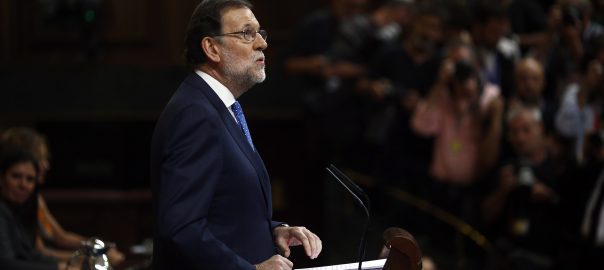19.06.2018 - 07:53
|
Actualització: 19.06.2018 - 09:53
Some things that yesterday seemed confusing are beginning to make much more sense today. Predictably, the reactions from Spain and Europe have helped us to understand where we stand at the moment. This is it, in a nutshell: Europe espouses a reform of the Spanish Constitution as a means to resolve the Catalan feud and, apparently, PM Mariano Rajoy agrees and obliges but, more importantly, he gains some time. Someone in Brussels might believe that this is the key to solving the Catalan conundrum, but they —and us— have a problem: they are proposing a solution that will solve nothing. Two details stand out, in particular. Firstly, how keen everyone in the UE was to come together and uphold the Spanish constitution. This support came after an unprecedented address by Donald Tusk on Tuesday —an hour before Puigdemont was due to speak in parliament— asking the Catalan president to exercise restraint and seek dialogue, whilst effectively treating the Spanish government and its Catalan counterpart as equals. Here lies the difference: when faced with a credible threat of a proclamation of independence, Europe spoke with a tone that distilled institutional respect, which it then went on to abandon right away. There is a lesson to be learnt here: only the proclamation of independence and its unilateral enforcement will prompt a change in the perception of what we are. Either we become an active subject in the negotiation or we will remain a mere object.
The second detail that stands out is the fact that, rather than PM Rajoy, it was PSOE leader Pedro Sánchez who announced the alleged new effort to reform the constitution. For Rajoy admitting that he must reform the constitution is a bitter pill to swallow after all these years staunchly refusing to do precisely that. However, allowing Sánchez to make the formal announcement means that the endeavour has zero credibility. If it were true, an announcement of such magnitude would merit a solemn declaration by the Spanish Prime Minister. And this is the key issue. Europe is putting pressure to come up with a solution that, eventually, will boil down to a promise to amend the constitution. Rajoy has agreed to it, but only because he has no other choice. Yet he gets Sánchez to announce it, while he threatens to end Catalonia’s home rule by invoking Article 155.
In other words, Rajoy is using Europe’s pincer movement, the middle path endorsed by Brussels which Catalan economist Elisenda Paluzie has described so well, to forge ahead with his original plan: rather than reaching a compromise that boosts Catalonia’s self-rule, he intends to curb it. In order to complete the circle, interestingly Sánchez made a point to say that Madrid’s vaporous initiative is compatible with invoking Article 155. Therefore, they will trigger Article 155 now and who knows if we will ever get a constitutional reform.
All in all, we would be making a mistake if we believed that we have got this far for any reason other than the international impact of Madrid’s crackdown and the Catalan people’s capacity to resist for the sake of their civil rights. Why on earth would Europe lift a finger to demand a constitutional reform, were it not for our fellow citizens heroically enduring the beatings administered by the Spanish police? It is the citizens taking to the streets that tips the scales in our favour, resistance is the element that sets the wheels in motion and, therefore, the problem isn’t going to go away, whether they are prepared to admit it or not.
Make no mistake: not only does Rajoy wish to halt independence, but he also wants to impose Madrid’s direct rule. Therefore, he will resort to force and institutional violence to the bitter end, persuaded as he is that the EU has granted him permission to do anything he deems necessary from now on. And so we will meet again in the streets and, once again, reality will prevail over this ridiculous arrangement that Brussels believes it has made with Madrid.
Today the disappointment with what happened on Tuesday evening in the Catalan Parliament is palpable. Everyone has a right to ask themselves: did our government make a mistake? Unfortunately, we do not have all the clues to answer that question yet. I certainly do not know if there was an actual mediation offer in the cards and whether that was the key to putting independence temporarily on hold. None of VilaWeb’s sources have provided confirmation that there was a genuine offer to mediate, but —admittedly— we cannot conclude that there isn’t one. Apparently the Catalan government has only managed to get Spain to budge an inch and propose to Europe a constitutional reform as the solution. It is not much: a step backwards, actually. But the fact that nothing has been deactivated makes up for it.
An international mediation would make sense in a Catalan-style Brioni process, but not in exchange for what they appear to be offering. We could agree to a second referendum sponsored by Europe or a clear recognition of our right to self-determination in any shape or form. We simply cannot accept that they expect us to be a fringe act in a constitutional reform devised to keep us in Spain. Unfortunately, I had warned that ours was not the Slovenian way and a suitable comparison could not be made between the two cases. But I admitted that it might work in the same way as Slovenia. However, it hasn’t turned out that way.
So we must learn our lesson and press the button. Independence —which has been proclaimed but put on hold— must be enacted as soon as PM Rajoy announces that Article 155 is being invoked or the minute Madrid’s crackdown makes a comeback. Without further delay. The plans for a constitutional reform announced today will not prevent Madrid’s crackdown. Quite the opposite: the amendments to the constitution will provide an alibi for Spain’s repression. So our government might have made a mistake. Europe may have mistaken our generosity for a sign of weakness, more than likely. But nobody must fool themselves: Catalonia’s political problem persists.
It persists because there is a Spanish government that keeps ignoring the existence of a gigantic political problem. It persists because Spain’s nationalism remains persuaded that there is nothing to discuss, no compromise to be made. But, above all, it persists because there is a parliamentary majority in Barcelona that can establish the Catalan republic whenever it sees fit. And, more than anything, because the Catalan people proved on October 1 that they were willing to do what it takes not to reform the Spanish constitution but to become a free nation.
There is a government that gambled everything on October 1 and may right its wrong, if a mistake has been made. We all know that some steps need to be taken before independence is effective. At any rate, the difference today lies in the disappointment of many and the realisation that Brussels bureaucrats have sided with Rajoy. This is inconsequential, so —at the end of the day— everything at stake is up to us. If the parliament and the government do the right thing and win back the people’s trust, we will all be transported back to the moment when Puigdemont announced that he was proclaiming independence. So, let’s get set and ready to win.


